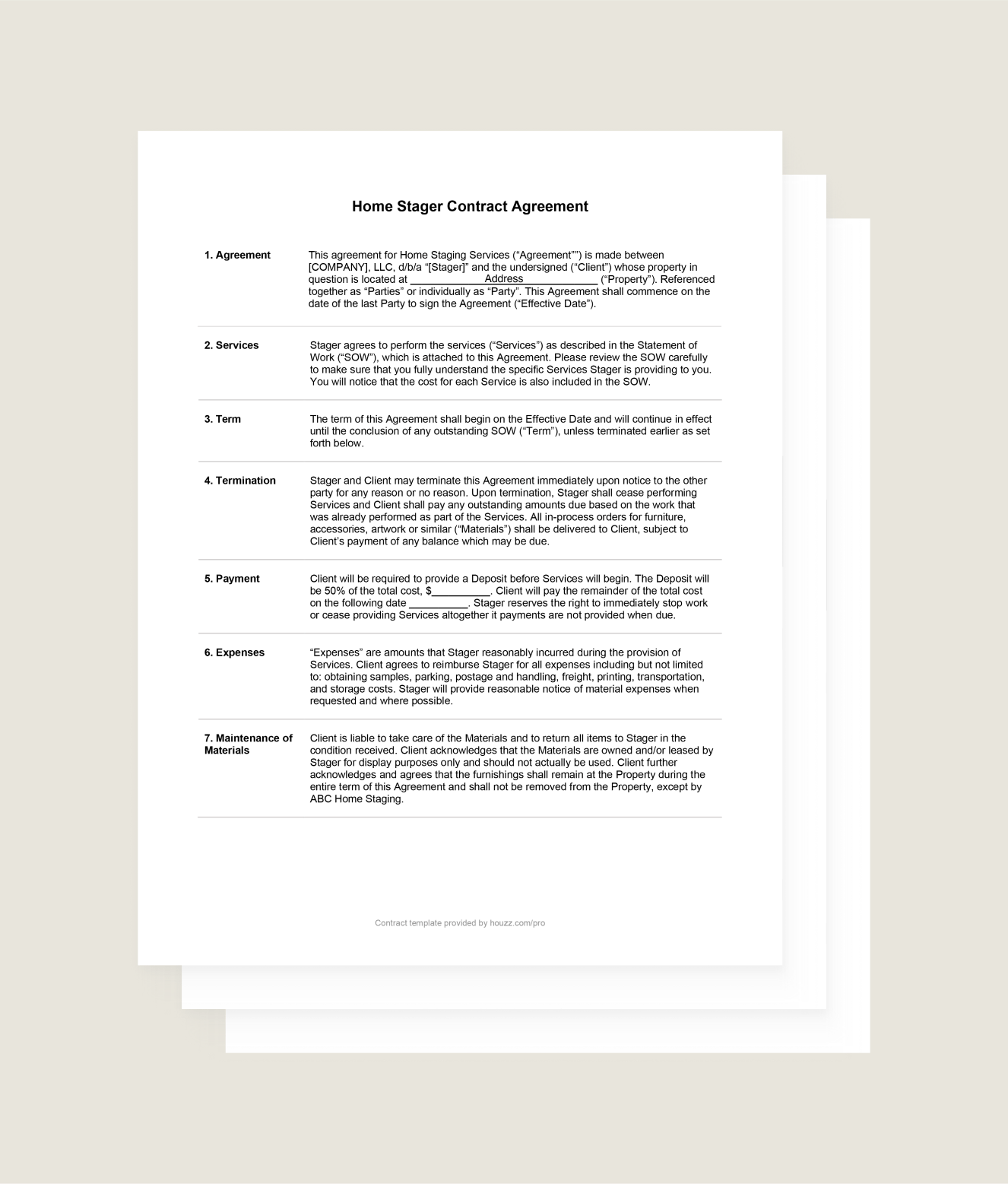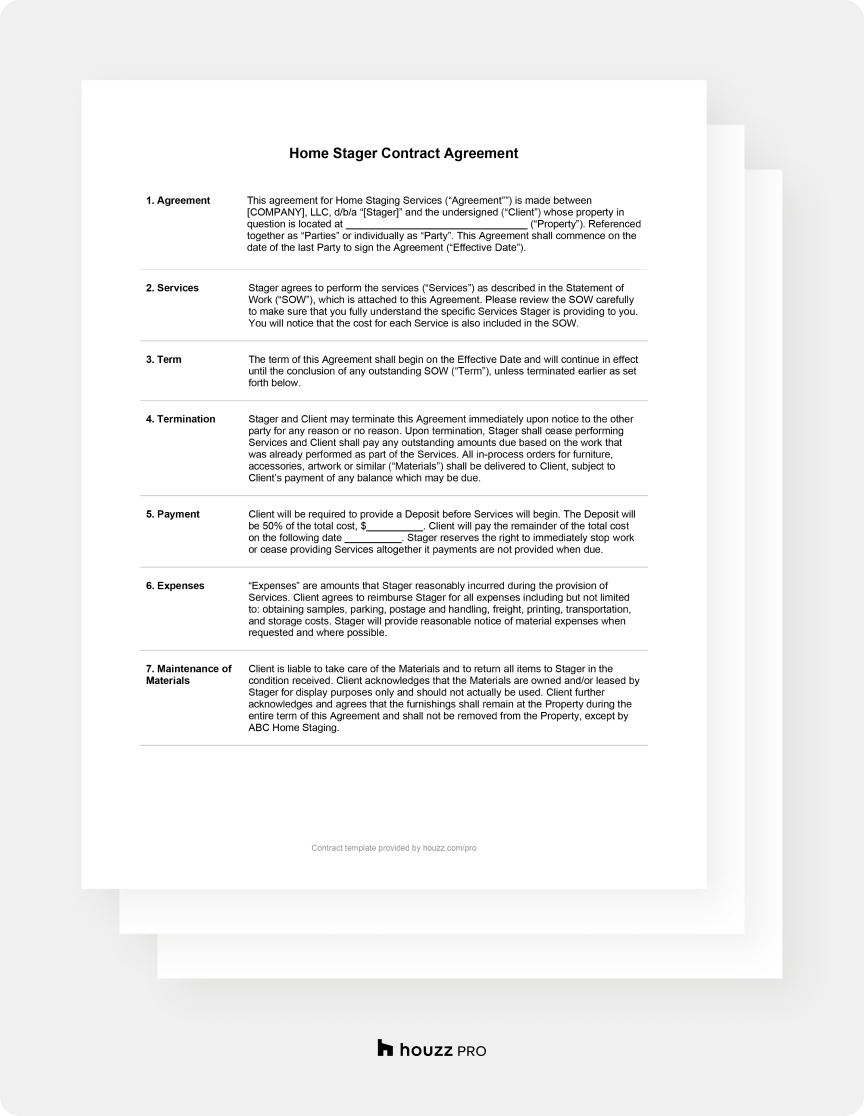Free Template: How to Write a Home Staging Contract
Protect the business you've worked hard to build. Download our free home staging contract template and staging contract sample available in PDF or Word.

A Home staging contract is a key way to protect both you and your clients in every project. In this article, we will show you everything you need to know about drafting and delivering a professional contract to your home staging clients.
We explain the importance of contracts, what information needs to be included and provide tips for making the task as easy and efficient as possible so you have more time to focus on the work you love. Included is a free, downloadable and editable home staging contract template to help you get started.
Click on a link below to jump to the section you’re most interested in:
- Download our free home staging contract template
- What is a staging contract?
- Why are staging contracts important?
- When do you need a home staging contract?
- 19 Clauses to include in a home staging contract template
- How to write a home staging contract template
- Tips for after you’ve drafted your staging contract template
Download our free home staging contract template

Here's a Staging Contract Template on Us!
Customize this Staging Contract Template to protect your business.
As a designer who stages homes to make them look gorgeous and inviting, chances are you would rather be tackling the next project rather than spending your time writing contracts. Still, contracts are an important part of your business and protecting your bottom line. Check out our home staging contract example above to get a head start on the process.

Luckily, there are tools out there to make running your business easier, including the paperwork. Home staging software helps you execute contracts more efficiently, and when it comes time for your client to approve them, let’s you offer them the conveniences of an e-signature. With business software, you can forget about storing your documents in bulky binders and file cabinets. All documents are kept safely in the cloud so they are organized, and easy to access when you need them.
Explore our e-signature and single central business hub features for free today with a free trial of Houzz Pro.

What is a home staging contract?
A home staging contract is a document that details every aspect of your staging job, including the cost, scope of work, terms and conditions and more. It is the go-to document you can refer to should questions or disputes arise during the project. A home staging contract can become legally binding once it is signed by all parties.
A contract differs from a change order or a scope of work document because it covers every aspect of the home staging work you are doing for a client who is selling or renting their home.

Why are home staging contract templates important?
Investing the time and effort in creating a comprehensive contract at the start of a project can save you headaches and money down the line. A contract can help avoid costly change orders, or worse yet, legal bills. A contract gives both you and your client protection and peace of mind. Having a signed contract lays out exactly what happens in various situations such as last minute changes, or cancellations, and also ensures everyone is on the same page about the scope of the staging project, what rooms will be transformed, and the type of furniture and accessories that will be used.

When do you need a home staging contract template?
Having a staging contract for every project no matter how big or small is good practice and can support you if a disagreement ever arises. You may have contracts with others involved in the staging work such as subcontractors, but this article focuses only on the contract with your clients. A contract should be drawn up, finalized and signed before any work begins.

19 Clauses to Include in a staging Contract Template
The clauses you include in your staging contract will vary depending on the nature of your staging project and the specific needs of your business. To get you started, we’ve gathered a list of some of the typical clauses included in every contract. As always, it is important to consult with a lawyer to make sure you have covered all your bases.
- Company & Client Information Include the information about your company and brand it with your logo. Also, list the name of the client, and contact information. In all cases, make sure you are using the full, legal names.
- Staging Property Provide the exact address and location of the staging property. If it is a multi-family home, note which unit will be staged, and what rooms to provide clarity.
- Services Detail what services your staging company is providing in the staging and de-staging of the property and when.
- Cleaning Make it clear who is responsible for cleaning the rooms before the staging begins so that your stagers do not arrive at a property in disarray with dusty overhead fans and dirty floors and countertops. Note the expectations around the cleaning and decluttering that should be done on the home prior to your services. Will any of the homeowner’s furniture remain or are you starting with an empty space?
- Scope of Work This section details the staging work you are provided. List the rooms that will be staged (and any excluded) and describe the type of staging that will be provided in each of these spaces. Be as comprehensive as possible to avoid disagreements down the road.
- Materials & Expenses Explain the type of materials, furniture and accessories that will make up the staging. Provide brand names, colors, textures, styles and more. Include the quantities of each material, and pricing. This is the section where you should include any other expenses associated with the staging process.
- Payment Terms Spell out the payment schedule, including what percentage deposit you seek up front and when payments are due. Include the penalties and procedures for late payments.
- Insurance Note the type of liability insurance your business carries and what the policy covers. This protects you and gives your clients peace of mind.
- Conditions & Responsibilities In this section, explain what conditions need to be met before work begins and list who is responsible for what throughout the project. For example, make it clear who is responsible for maintaining and cleaning the rooms and materials during the life of the staging project. Also, provide clarity on who has the authority to contact you to begin the destaging. Make sure you spell out in the contract how much lead time you need and how much time you have to remove the items after being notified so that you are not scrambling to empty the space.
- Cancellation & Refund Under what conditions can the contract be canceled? Explain those terms, the consequences of termination and under what scenarios, a refund would be issued.
- Amendments Changes may be made to the contract and this section details the process for that.
- Governing Law A contract should note what state and state laws will be the governing body that interprets the language of the contract.
- Dispute Resolution This outlines the procedures for resolving conflicts such as mediation, arbitration or litigation..
- Warranties Note the guarantees you provide for your design and staging work, what it covers and for how long.
- Indemnity Staging contracts typically require staging companies to compensate (indemnify) the client for any injury or losses associated with the work or resulting from a breach in the contract. Third parties, such as other subcontractors hired by the client, may also need to be included.
- Force Majeure Thankfully, you are not responsible for everything that can go wrong. This states that you are not liable for damage caused by circumstances beyond your control such as natural disasters.
- Signature Terms Include a line and date for approval signatures and explain the terms that the approvers are agreeing to.

How to Create a Home Staging Contract Step-by-Step
A comprehensive contract sets clear expectations, prevents misunderstandings, and helps ensure that your staging project runs smoothly. Here are some steps to smooth your contract-writing journey:
- Create a Budget The contract should include the exact and final cost of the staging project so make sure you have calculated all the expenses associated with the work, and have a quote or estimate prepared.
- Set a Schedule Determine the end and start dates of the staging project and the timeline for installation and de-staging (if you know the latter). Add target dates for various stages of the staging work and design.
- Define Provisions of Equipment & Materials Another key part of the project is determining the pricing and sourcing of the equipment and materials that will be used in your staging. If the items are coming from storage or a subcontractor, do an inventory to confirm their availability and condition.
- Finalize the Scope of the Work Ensuring that you completely understand the expectations of the client and scope of the work avoids issues down the road. This may require checking back with the client to clarify and confirm their vision for the project and the staging work you will provide.
- Determine Payment Schedule Set the terms and stages of payment before writing up the staging contract. Seeking a deposit before any work begins is good practice and assures the client is committed to your company and the staging work.
- Draft Contract Now that you have gathered every detail of the staging you will provide, it’s time to draft your contract. Add the information into the contract under each heading.
- Consult With a Lawyer Before you send a contract to a client, protect your business by seeking the advice of a lawyer to ensure that you have adequately covered all the requirements.
- Review & Send Once you are happy and confident that the contract has covered all the bases, review it one more time and then send it to your client.

What’s next? Final Tips for Creating a Staging Contract Template
- Research State Requirements States have varying provisions and requirements regarding contracts for staging work. Check the websites of the state or states in which you are conducting business.
- Include Your License Number List your license number on the contract. It is good practice to include this information on all your business documents such as estimates, invoices and your website. Besides the legal implications, licensing signals the professionalism of your business, and adds assurance for clients.
- IMPORTANT NOTE: Seek Counsel from a Professional Lawyer To make sure your contract is legally airtight, have a lawyer review any legal language in the contract or the contract in full. Paying an attorney up front to review your contract may end up saving you money in the long run in case of disputes.
- Don’t Forget the Signatures A contract is not valid unless it is signed and dated. Make it easy for clients to sign off by providing them with the ability to sign digitally, or online.
- Store Documents Safely Devise a secure place to store the contract and all your business documents so they can be referred to in the future and to protect the privacy of your clients and your business. Cloud-based storage that provides security and makes it easy to organize all your documents in a single place.

Conclusion
Yes, most home stagers would rather be spending their time envisioning and directing the design of a staging project than poring over a contract. Yet contracts are an important way to protect your business and smooth your staging journey. They help keep everyone on the same page and provide a legal document to help resolve disputes.
Using a home staging contract template is a great way to learn to write contracts, but there are even more effective tools available that make drafting a contract easier and more efficient.
Sign up for a free trial of Houzz Pro home staging business software to explore our client communication, lead nurturing and file sharing features - all of which can help you keep client documentation organized.
Learn more about growing your staging business and How to Master Team Motivation Using Houzz Pro.
The information contained in this article should not be relied upon as legal, business or tax advice. We encourage you to seek guidance from your legal counsel, business adviser or tax specialist regarding how this sample home staging contract might or might not apply specifically to your business.

Want advice delivered to your inbox?
Unlock industry insights and updates for contractors and design pros
By signing up, I agree to the Houzz Terms of Use and Privacy Policy and that Houzz may use my information to contact me about relevant content, products, and services.












Join the conversation by commenting or asking a question below. The Houzz team reads every single comment, and we’ll get back to you by email if you need us!